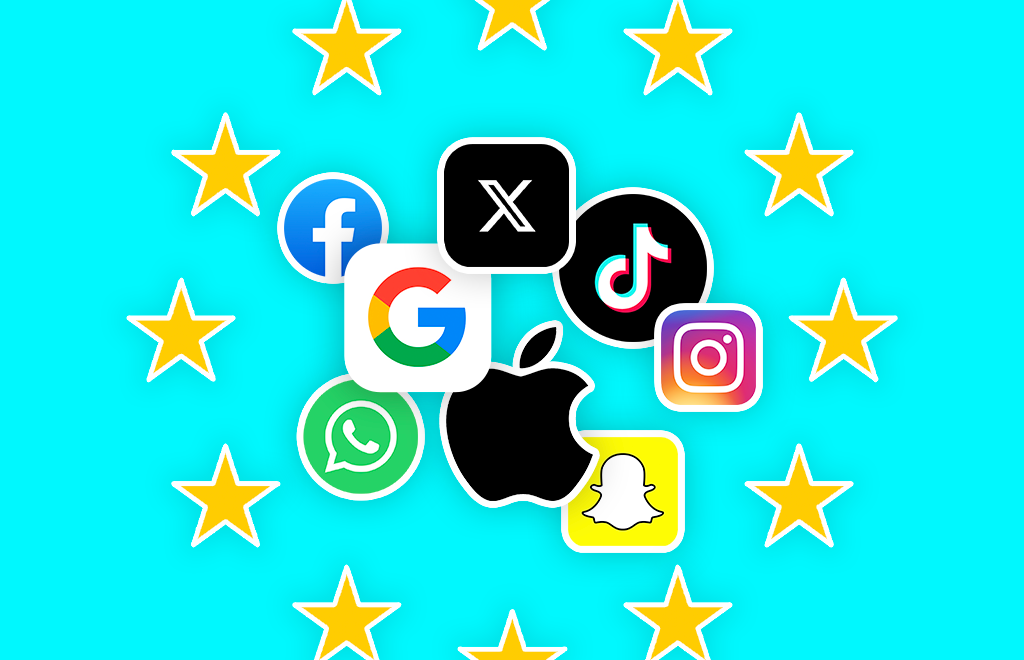The European Union has made massive strides to rein in Big Tech with the landmark Digital Services Act (DSA) and Digital Markets Act (DMA), which have already prompted significant changes from Big Tech companies.
It’s exciting to see such progress – the EU has shown the world it’s possible to take on Big Tech and win, but people around the world deserve strong user safety and privacy protections, too. It’s time for American lawmakers to meet the moment by compelling these platforms to respect competition law and clamp down on harmful content.
Digital Services Act: The DSA was approved by the European Parliament in July 2022. The sweeping package of legislation goes into effect in January 2024 with requirements for very large online platforms to be transparent about their algorithms and prompt in removing illegal content.
- Because the DSA requires platforms to allow users to opt out of AI recommendations, Facebook and Instagram users in Europe are now able to turn off recommendation algorithms and view content on their feeds in chronological order. When users search for terms, the results will appear based only on the words they enter and not influenced by previous app activity. TikTok’s For You page for European users features global, not personalized content, mitigating the dense and addictive filter bubbles many users experience with social media content.
- The DSA’s “notice and action” regime requires platforms to have additional mechanisms for users to report illegal content. All platforms must establish a “Trusted Flagger” program for experts to submit violation reports for expedited review. After a user reports a harmful piece of content, the online platforms must act upon these reports “without undue delay” and notify the user of their decision. As a result of the legislation, TikTok has started giving users an additional option for reporting content they think is illegal.
- As part of the EU’s anti-counterfeit efforts, service providers are subject to stringent rules that require sellers to prove their products are legitimate. With the DSA’s improved flagging system, users will have greater recourse to report counterfeit goods. For example Amazon has made it easier for customers to report suspected illegal products.
- The DSA requires large online platforms to publish transparency reports on their content moderation practices in the EU to remove illegal, false, harmful, and misleading content. The first reports submitted by platforms begin to open the black box of Big Tech’s data and content moderation efforts across the continent.
- The DSA fully bans surveillance advertising aimed at kids and prohibits ad targeting based on users’ sensitive data, such as religious beliefs, sexual orientation, race, or ethnicity. After the passage of the DSA, Google has globally endorsed banning targeted ads at kids.
Digital Markets Act: Focused on ensuring fair competition online, the DMA ensures gatekeepers don’t favor their own products or services at the expense of small businesses and consumers. Platforms cannot restrict businesses from offering customers better deals or exploit user data to give in-house products and services an advantage over competitors.
- As a result of the passage of the DMA, Apple has indicated that its iPhones will allow third-party app stores.
- Consumers will then be able to download software to their iPhones from other app stores. This type of competition means that developers can reach consumers without losing 30% of app purchases to Apple.
Common Charger: The EU passed a law requiring tech companies to use a USB-C port universal charging port by December 2024.
- Rather than use their proprietary charger, Apple’s newest iPhones will use a USB-C charger now. This change will save consumers money – and likely also frustration – because they’ll no longer need to own a different charger for different devices.
Antitrust: The EU has leveraged antitrust regulations to effectively go after Big Tech companies for abusing their market dominance by squeezing out competitors and raising prices on consumers.
- In 2017, the European Commission fined Google about $2.5 billion for violating antitrust rules. The search giant abused their market dominance by giving priority to their own service, Google Product Search, at the expense of competitors, which were demoted when users searched for comparison shopping services. As a result of the ruling, Google stopped these practices within 90 days to respect the principle of “equal treatment” in search results.
- Amazon settled three cases with the EU to narrowly avoid a fine after using independent seller data to boost their own products, ensuring sellers have equal treatment when ranking offers for the “buy box,” which allows customers to instantly purchase an item without choosing the seller. Lastly, Amazon must allow sellers that use Prime to coordinate their own delivery instead of requiring Amazon-approved delivery logistics. In order to avoid being fined 10% of total annual turnover, Amazon committed only use public seller data for their retail business, treat all sellers equally when ranking offers for a “buy box” winner, and allow Prime sellers to coordinate delivery logistics of their choosing in Europe.
Privacy: If you’ve ever been to Europe, you’ll notice every website allows you to opt into using cookies. The ePrivacy Directive, passed in 2002, mandates that every website receives a user’s explicit consent before storing their data.
- The ePrivacy Directive also requires these websites to inform users of the cookies’ general purpose. The purpose is to minimize data processing and give users greater knowledge and control of how their data is used. The adoption of these cookie notices has spread beyond Europe to websites across the world.
- In May, the European Union fined Meta a record $1.3 billion and ordered them to stop transferring European user data across the Atlantic. This was the largest fine since the GDPR was implemented five years ago. In response to the fine, Meta has agreed to a new Data Privacy Framework for transfers of data from the EU to the U.S.
- In response to an expanded ban on targeted advertising, Meta now allows users in the EU to choose an ad-free subscription for using Facebook or Instagram. By not selecting the ad-free subscription, users opt-in to targeted ads on the platforms.
The EU has demonstrated that it’s possible to take on Big Tech and win. American policymakers should take a page from Europe’s book or else the rules of the digital world will be written without them.








